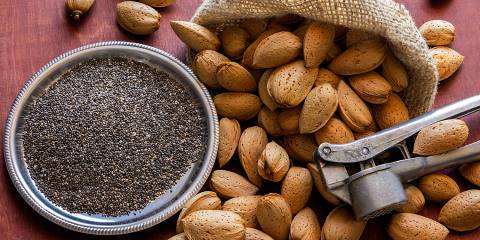How fast is a fast fast? No, that’s not a tongue twister (though feel free to say it three times—fast). Short-term or intermittent fasting is gaining popularity as a route to not just weight control but to potentially living a longer, healthier life.
What Is Intermittent Fasting?
Intermittent fasting is an eating plan that includes cycling between fasting and non-fasting, as well as rotating in regular periods of very low-calorie eating.
Does Fasting Work?
There’s evidence that, in animals including rodents and fruit flies, a lifelong restricted diet that cuts calories by more than a third leads to a lifespan that’s a third longer.
Does it work for humans too?
Scientists haven’t figured that out yet, though evidence backs the idea that, in people, eating a calorie-limited diet leads to longer periods of good health with fewer of the diseases that typically strike in old age.
Still, who would want to deny themselves the pleasures of foods for an entire lifetime? Luckily, we don’t have to. We can get the benefits of long-term fasting with daily, weekly, or monthly short-term fasts or calorie restrictions, according to recent research.
The Science Behind Restricted-Calorie Diets
Mark Mattson, PhD, who heads the neurosciences lab at the National Institute on Aging, is an expert on the science behind intermittent fasting. He has contributed to a number of studies on intermittent fasting and calorie-restricted diets involving both animals and humans.
Results indicate that cycles of fasting may support cardiovascular health, lead to improved learning and memory and decreased symptoms of Alzheimer’s disease, and alleviate symptoms of asthma.
How Does Intermittent Fasting Work?
-
Promotes Cellular Strength
One theory is that fasting puts cells under mild stress. “They respond to the stress adaptively by enhancing their ability to cope with stress and, maybe, to resist disease,” Dr. Mattson told the Canadian Medical Association Journal.
-
Resets the Immune System
Valter Longo, PhD, of the University of Southern California, argued in a 2014 study that three days of fasting can “reset” the immune system and trigger the production of new white blood cells, helping to ward off disease.
-
Humans Naturally Adapted to Fasting
While researchers have done many recent studies on fasting, it is not new. According to Francoise Wilhelmi de Toledo, MD, medical director of the Buchinger Wilhelmi Clinic in Germany, the propensity to deprive oneself of food is evolutionary and natural.
Dr. de Toledo contends that because food was often in short supply as humans evolved, our bodies have adapted. Throughout history, droughts and other harsh conditions produced food shortages that caused our ancestors to fast—often involuntarily—and our bodies eventually got the message.
The Benefits of Fasting
-
Reproductive Health
Studies indicate that benefits of fasting include improved reproductive features (in menstrual cyclicity, ovulation, and fertility) and metabolism.
-
Joint Health
Pain and stiffness from rheumatoid arthritis improved when study participants employed fasting techniques for one to two weeks.
-
Cardiovascular Health
Fasting showed promise in improving cardiovascular health by lowering high blood pressure and reducing the cholesterol that can clog arteries and cause heart attacks.
Not only do fasting people lose weight, but their arteries are less inflamed if they fast every other day or employ the 5:2 Fast Diet (which features five days of regular eating and two fasting days each week). With both techniques, fasting days provide about one fourth of a person’s normal caloric intake.
An abstract from a 2024 conference presentation suggested that intermittent fasting may not reduce risk of cardiovascular death. The data has not yet been reviewed nor has it gone through the process of validation. Researchers have yet to compare and analyze a time-restricted eating group with a non-time-restricted feeding group.
-
Long-Term Health
Scientists think fasting mildly stresses cells. They surmise that on low-calorie days, the body is forced to deal with this mild stress, which strengthens the long-term ability to ward off disease.
Intermittent Fasting Plans
Unlike traditional diets, intermittent fasting is more about when you eat than what you eat. The idea is to skip or limit food for a certain number of hours in a day or a certain number of days in a week or month. Here are some common approaches.
-
Every-Other-Day Fasting
Every-other-day fasting suggests you eat normally on the first day, then limit yourself to 500 calories (for women) or 600 (for men) the next. Continue to alternate.
With only 500 calories on your fasting day, it’s critical you make those 500 calories count, so choose food wisely. Opt for nutrient-rich foods, such as lean proteins and fresh produce.
-
Half-Day Fasting
Half-day fasting is essentially 12 hours on—when eating is permitted—and 12 hours off, when you fast. Beginning the fast in the evening makes the limited food intake much easier to tolerate since you’ll be dozing for about two-thirds of the period.
Over time, you might find you can increase your fasting hours to 16 hours a day. Some research shows increased health benefits if you limit eating to eight hours per day.
-
The 5:2 Plan
Eat what you normally do for five days a week, and eat just 500 calories on the other two (nonconsecutive) days.
-
The 16:8 Plan
Fast for 16 consecutive hours during every 24-hour period, limiting your eating to the other eight hours. For instance, have your first meal at 10 a.m. and finish your last meal by 6 p.m.
-
Eat-Stop-Eat
Fast for 24 hours once or twice a week.
-
Five Days a Month
Cut your food intake by 30 to 40 percent for five consecutive days a month, and eat as you normally do on the other days.
In a recent study, human volunteers who were put on a regimen of 725 to 1,090 calories a day for five days a month lost abdominal fat, became more fit, and had lower blood glucose levels than a control group after only three months.
-
Convenience Plan
If you can’t adopt a regular mode of intermittent fasting, try fasting when it works for your schedule. Skip a meal if you’re not hungry, or take a day off from eating when the time is right. You’ll still get some of the benefits of a more structured plan.
Fasting Precautions
-
Stay Hydrated
Be sure to drink plenty of noncaloric liquids while you are fasting. Water, unsweetened coffee and tea (a splash of milk or cream is OK), and other sugar-free drinks will help keep you hydrated.
-
Check with Your Doctor
Check with your healthcare provider before you make any radical changes in your eating habits, especially if you have medical conditions. People who should not fast include children, those who are underweight or have a history of eating disorders, and women who are pregnant, breastfeeding, or trying to conceive.






